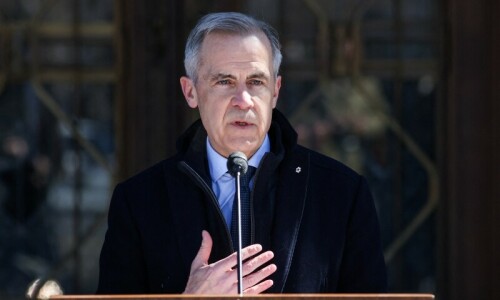
LONDON: WikiLeaks founder Julian Assange revels in disclosing military secrets through his whistleblower website, but his own life is shrouded in mystery.
A batch of almost 400,000 classified documents was released by the website on Friday, alleging among other things that the US military covered up the torture and abuse of Iraqis by Iraqi security forces.
They also suggest that hundreds of civilians were killed at US military checkpoints after the US-led invasion of 2003 that ousted Saddam Hussein.
The lanky Assange, holding court at a news conference in London on Saturday, defended the release of the documents as a chance to show the “truth” of the Iraq war.
Dressed in a sober dark suit, white shirt and a striped tie, he spoke slowly and deliberately as he reeled off numbers and details buried in the documents – claiming, for instance, that WikiLeaks had revealed the previously undocumented deaths of 15,000 civilians in Iraq.
The latest release of the documents, following a batch of some 90,000 logs about the US role in the Afghanistan war published by the secretive website in July, cemented Assange’s reputation as a scourge of the Pentagon.
Assange dismisses allegations of rape made against him in Sweden, claiming he is the victim of a dirty tricks campaign.
On Monday, the 39-year-old Australian former computer hacker was denied a permit he had applied for to live and work in Sweden as he failed to fulfil the requirements.
He had applied to the Swedish Migration Board for a residence permit on August 18, but two days after he filed his application media reports revealed two women had made allegations to police of rape and molestation.
The probe in Sweden continues, although it did not bar him from leaving the country. Assange had notched up a number of scoops, ranging from Iraq to Iceland, even before his master stroke on Afghanistan catapulted him into the global spotlight.
WikiLeaks published nearly 77,000 classified US military documents on the war in Afghanistan on July 23.
Despite a wave of criticism that he had endangered lives – especially where names had been left unredacted – Assange insists the publication was an important part of WikiLeaks’ goal to revolutionise journalism.
“We are creating a new standard for free press,” he told AFP during a visit to Stockholm, adding that “by doing so, we are hoping to liberalise the press across the world.”
Assange may claim to be a champion of transparency, but divulges little about himself and refuses even to give his date of birth.
He is constantly on the move, bouncing from capital to capital and staying with supporters and friends of friends, and says secrecy comes with the territory.
“We deal with organisations that do not follow the rules. We deal with intelligence agencies,” he said.
What is known is that he was born in 1971 on Magnetic Island in northeastern Australia and in his early life lived there with his mother.
Assange has described his childhood as nomadic, attending 37 different schools.
Growing up in Melbourne in the 1990s he discovered a new talent: hacking.
But his new interest did not go undetected and he was charged with 30 counts of computer crime, including hacking police and US military computers.
He admitted most of the charges and escaped with a fine.
Assange says he then worked as a security consultant, a researcher in journalism and started his own IT company.
In 2006, WikiLeaks was born.
“It started as a collaboration between a dozen people from human rights, journalism and technology” backgrounds, he said.
“We have three goals: free the press, establish rights and wrongs through exposing abuses and create and preserve the historical record.”
The Icelandic capital Reykjavik was the birthplace of WikiLeaks’ first global scoop, a graphic video of a US military Apache helicopter strike in Baghdad in 2007 that killed two Reuters employees and a number of other people.
Since the Afghanistan documents were published, Assange has kept a low profile.
He now refuses to provide a mobile phone number and says he suspects Australian authorities have frozen his bank account. — AFP














































